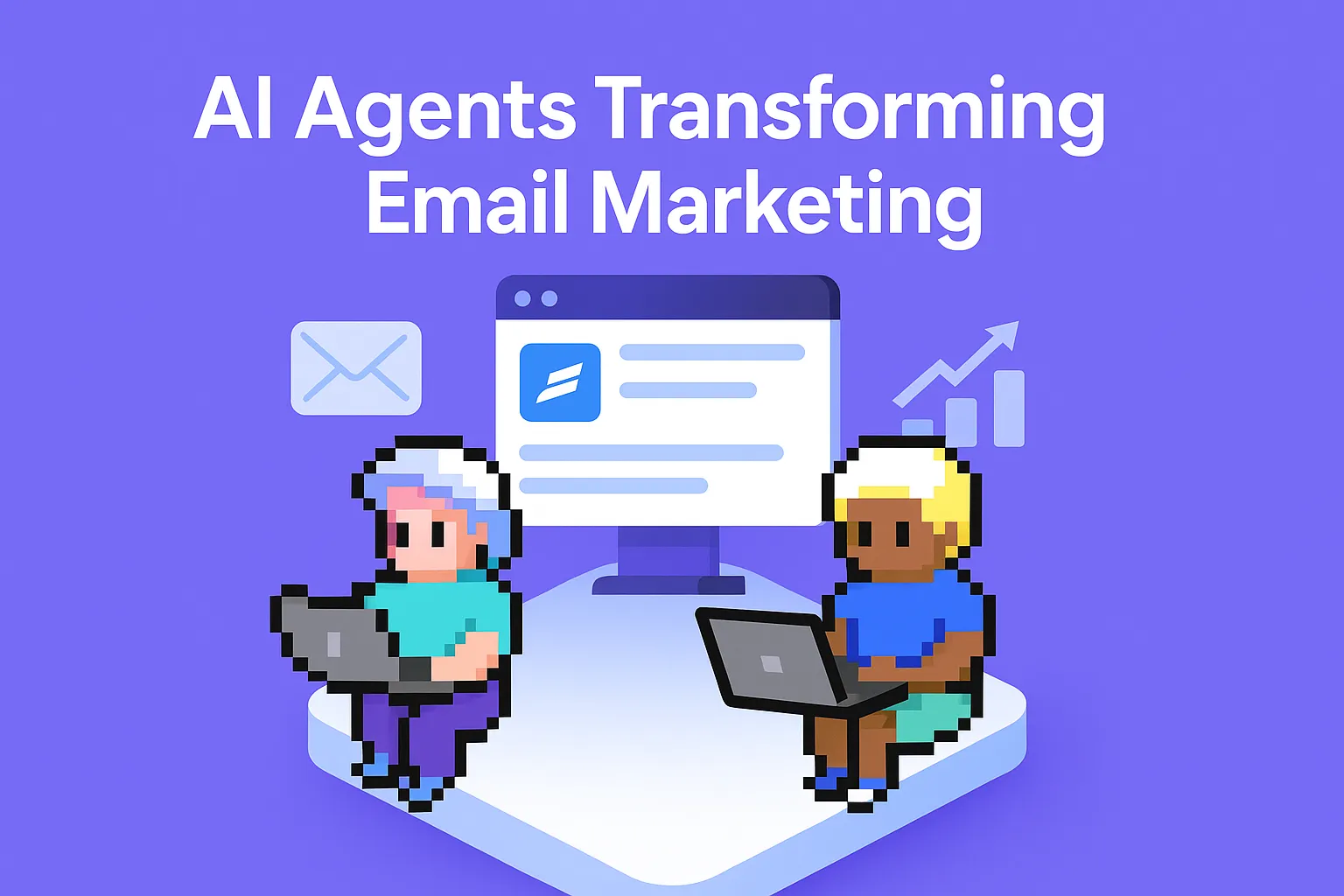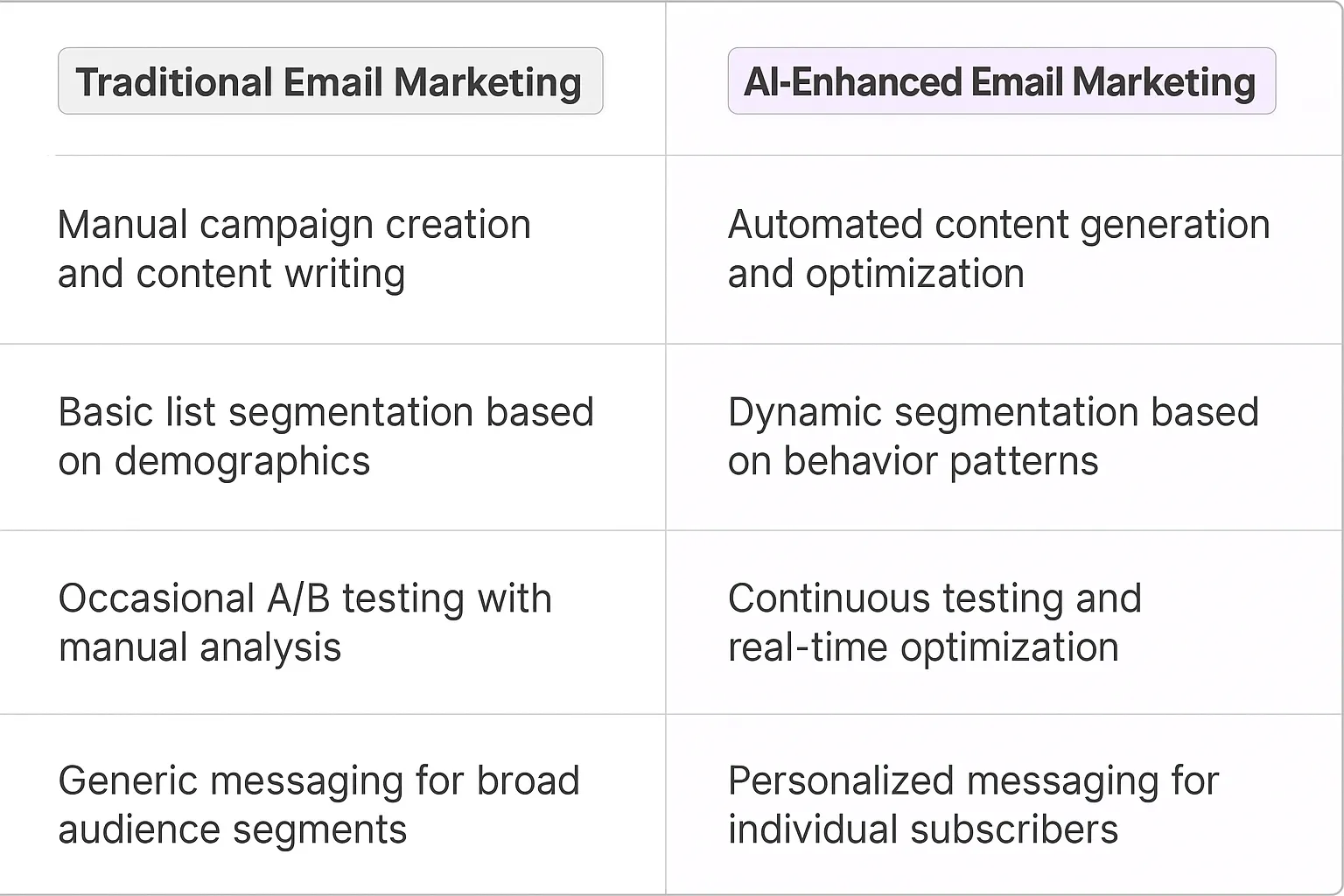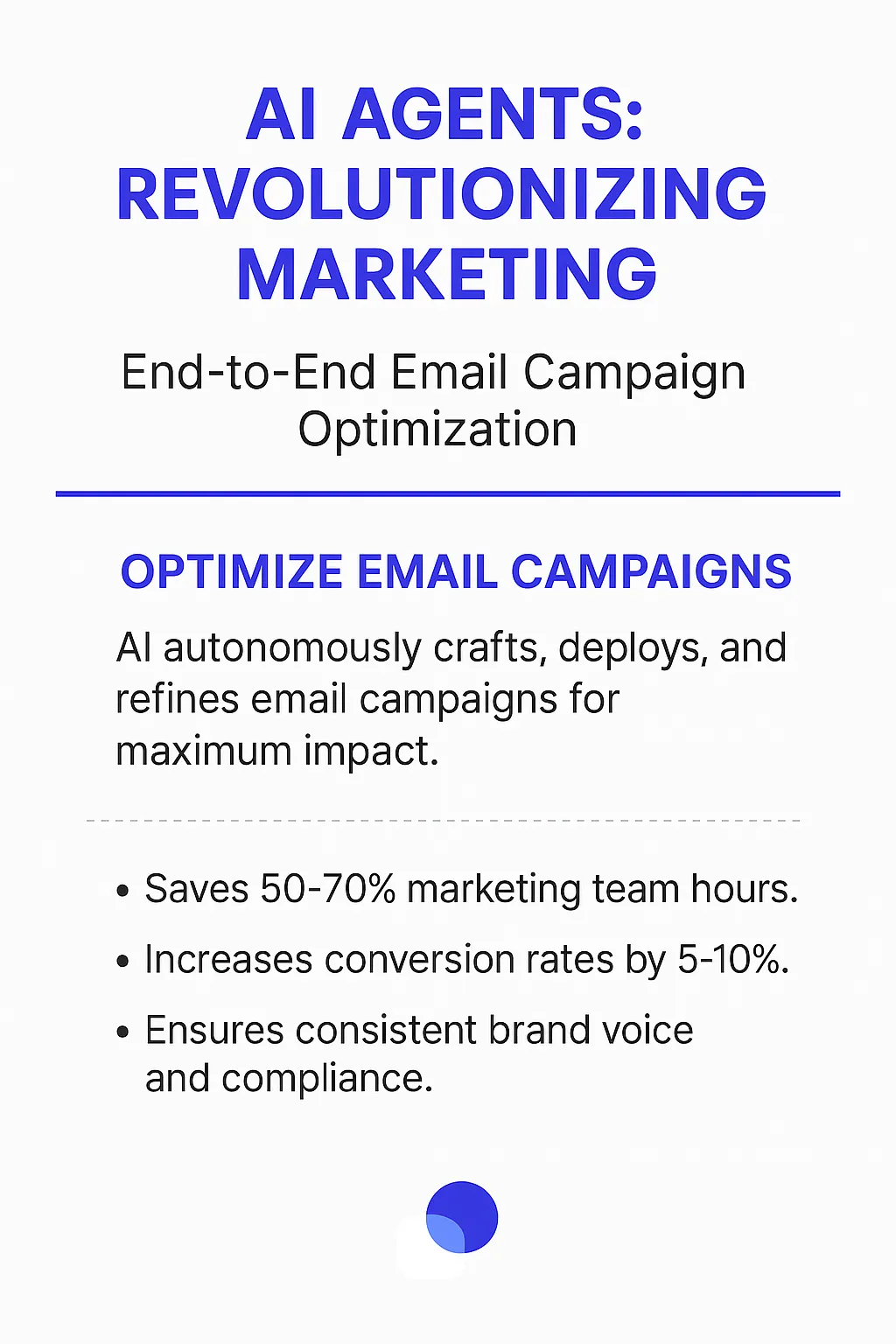Constant Contact
Understanding Constant Contact's Marketing Platform
Constant Contact stands as a pioneering email marketing platform that serves over 600,000 small businesses and organizations. The platform combines robust email campaign tools, contact management features, and analytics capabilities to help businesses build and maintain meaningful relationships with their audience through email marketing.
Key Features of Constant Contact
The platform excels in several core areas:- Drag-and-drop email builder with mobile-responsive templates- Advanced list management and segmentation capabilities- Real-time tracking and reporting tools- Integration with major e-commerce and CRM platforms- Automated email series and trigger-based campaigns- A/B testing functionality- Social media marketing tools

Benefits of AI Agents for Constant Contact
What would have been used before AI Agents?
Marketing teams traditionally relied on manual email campaign creation in Constant Contact, spending hours crafting subject lines, writing copy, and designing layouts. They'd reference past campaigns, competitor research, and gut instinct to make decisions about messaging and timing. A/B testing required meticulous tracking and analysis, while personalization meant painstakingly segmenting lists and creating multiple versions of content.
What are the benefits of AI Agents?
AI Agents transform email marketing execution in Constant Contact through pattern recognition and data-driven optimization. These digital teammates analyze vast amounts of historical campaign data to identify what actually drives opens, clicks, and conversions across different audience segments.
The most significant advantage comes from the agents' ability to generate and test multiple variations of email content simultaneously. They can craft subject lines that resonate with specific audience segments, generate body copy that maintains brand voice, and optimize send times based on recipient behavior patterns.
For personalization, AI Agents move beyond basic merge fields to create truly dynamic content that adapts based on individual subscriber interactions and preferences. They can automatically segment audiences and create targeted messaging that speaks to specific customer behaviors and interests.
The real power lies in continuous learning and optimization. While human marketers might run occasional A/B tests, AI Agents constantly analyze performance data and refine their approach, leading to steadily improving results over time. This creates a compound effect where each campaign builds on the insights from previous ones.
From a resource perspective, Marketing teams can focus on high-level strategy and creative direction while AI Agents handle the time-intensive tasks of content creation, testing, and optimization. This shift enables teams to scale their email marketing efforts without proportionally increasing headcount or hours spent.

Potential Use Cases of AI Agents with Constant Contact
Email Marketing Campaign Creation
AI Agents analyze historical campaign performance data to craft compelling email subject lines and content that resonates with specific audience segments. They identify optimal send times based on past engagement patterns and suggest personalized content elements that drive higher open rates.
Contact List Management
Digital teammates automatically clean and segment contact lists based on engagement metrics, purchase history, and demographic data. They identify duplicate entries, update outdated information, and create targeted segments for more effective campaign targeting.
A/B Testing Optimization
AI Agents continuously monitor split test results across email campaigns, analyzing which elements - from CTAs to images - drive the highest conversion rates. They generate data-driven recommendations for future campaigns based on winning combinations.
Content Personalization
The AI analyzes subscriber behavior patterns to create dynamic content blocks that adapt to individual preferences. It generates personalized product recommendations and tailored messaging that speaks directly to each segment's interests and needs.
Campaign Performance Analysis
Digital teammates process campaign metrics in real-time, identifying trends and patterns in open rates, click-through rates, and conversion data. They generate actionable insights and specific recommendations for improving future campaign performance.
Automated Response Management
AI Agents monitor incoming subscriber responses, categorize feedback, and draft appropriate follow-up messages. They identify common questions or concerns and create templated responses for quick, consistent communication.
List Growth Strategy
The AI analyzes successful list-building tactics, suggesting optimal placement for sign-up forms, effective lead magnets, and strategic timing for subscription prompts. It identifies patterns in successful subscriber acquisition and retention strategies.
Compliance Monitoring
Digital teammates scan email content and subscriber management practices to ensure compliance with email marketing regulations like CAN-SPAM and GDPR. They flag potential issues before campaigns go live and suggest compliant alternatives.
These use cases represent the intersection of AI capability and email marketing expertise, enabling marketers to focus on strategy while their digital teammates handle the data-intensive aspects of campaign management and optimization.

Industry Use Cases
AI agents are transforming how businesses leverage Constant Contact's email marketing platform across multiple sectors. The integration of AI capabilities creates opportunities for deeper customer engagement and more sophisticated campaign management. Drawing from real-world applications, these industry examples demonstrate how organizations are achieving meaningful results through AI-enhanced email marketing.
The key difference maker is how AI agents can analyze subscriber behavior patterns, engagement metrics, and conversion data to continuously optimize email campaigns. Rather than relying on static templates or manual A/B testing, these digital teammates work alongside marketing teams to identify winning combinations of subject lines, content, and send times that resonate with specific audience segments.
What makes this particularly powerful is the ability to process and act on data at a scale that would be impossible for human marketers alone. Whether it's a retail brand personalizing product recommendations or a nonprofit tailoring donation appeals, AI agents help deliver the right message to the right person at the right time.
Real Estate Marketing Automation That Actually Works
Real estate professionals face a unique challenge - staying top of mind with past clients while nurturing potential buyers and sellers through long decision cycles. The traditional approach of manually crafting individual email campaigns for different segments burns precious hours that could be spent showing properties or closing deals.A Constant Contact AI Agent transforms this dynamic by functioning as a dedicated digital marketing specialist. The agent analyzes past transaction data, current market conditions, and individual client preferences to automatically generate hyper-relevant content for different audience segments.For example, when working with first-time homebuyers, the agent crafts educational email sequences about mortgage pre-approval, home inspection tips, and neighborhood guides. For past clients, it creates personalized market updates featuring recent sales in their area, projected property value changes, and timely maintenance reminders.The agent also monitors engagement metrics to identify which topics and content styles drive the highest open and click-through rates. This data helps optimize future campaigns - if renovation tips consistently outperform market updates for a particular segment, the agent adjusts content accordingly.Beyond basic email marketing, the agent coordinates multi-channel follow-ups by flagging opportunities for personal outreach when subscribers show high engagement. A client repeatedly clicking links about selling their home triggers an alert for the agent to schedule a valuation consultation.The results speak for themselves: Real estate professionals using AI-powered email marketing see 3-4x higher engagement rates and 2x more referral business compared to manual approaches. More importantly, they reclaim 5-10 hours per week previously spent on marketing tasks - time better invested in building face-to-face relationships with clients.
Nonprofit Donor Engagement That Drives Real Impact
Nonprofit organizations often struggle with the delicate balance of donor communications - too little contact risks losing engagement, while too frequent outreach can lead to donor fatigue. The traditional approach of manually segmenting donors and crafting individual campaign messages consumes valuable resources that could be directed toward the mission.A Constant Contact AI Agent acts as a dedicated donor relations specialist, analyzing giving patterns, engagement history, and donor preferences to create meaningful, personalized communications at scale. The agent understands the nuanced differences between major donors, monthly supporters, and first-time contributors.For major donors, the agent develops sophisticated impact reporting emails showcasing specific projects their contributions have funded, complete with compelling statistics and beneficiary stories. Monthly donors receive regular updates about ongoing programs, volunteer opportunities, and behind-the-scenes glimpses into the organization's work.The agent continuously learns from donor behavior, identifying which types of stories and impact metrics resonate most strongly with different segments. When a particular campaign generates exceptional engagement, the agent automatically adapts future content to emphasize similar themes and storytelling approaches.Most importantly, the agent recognizes critical moments in the donor journey. When someone increases their monthly gift, the system triggers a personalized thank you sequence. If a long-time donor shows declining engagement, the agent flags this for the development team to initiate personal outreach.The data shows nonprofits implementing AI-driven donor communications see a 40% increase in donor retention and a 25% boost in average gift size. This translates directly into expanded program impact - all while reducing the administrative burden on development staff by 60%.The key insight: successful nonprofit fundraising isn't about sending more emails - it's about sending the right message to the right donor at the right time. AI makes this level of sophistication accessible to organizations of any size.
Considerations for Constant Contact AI Integration
Implementing AI agents within Constant Contact requires careful planning and strategic thinking around several key areas. The integration touches multiple aspects of email marketing operations and demands a thoughtful approach to both technical and human factors.
Technical Considerations
API rate limits pose a significant constraint when integrating AI agents with Constant Contact. The platform's API throttling can impact how quickly the AI can process subscriber data and campaign metrics. Organizations need to build robust error handling and queue management systems to prevent data loss during high-volume operations.
Data synchronization between Constant Contact and AI systems requires careful architecture planning. Contact lists, campaign performance metrics, and engagement data must flow seamlessly while maintaining data integrity. This often necessitates building custom middleware to handle the translation between different data formats.
Operational Challenges
Email marketing teams often face a learning curve when adapting to AI-enhanced workflows. The transition requires clear documentation, training programs, and a phased rollout approach. Teams need time to understand how to effectively use AI suggestions for subject lines, content optimization, and send-time recommendations.
Content governance becomes more complex with AI involvement. Marketing teams must establish clear guidelines for AI-generated content, including tone of voice parameters, brand compliance checks, and approval workflows. This prevents potential brand inconsistencies while maintaining the efficiency gains from AI automation.
Performance Monitoring
Tracking AI agent performance requires new metrics beyond traditional email marketing KPIs. Teams need to monitor accuracy rates of AI suggestions, implementation rates of AI recommendations, and the impact on key metrics like open rates and click-through rates. This data helps optimize the AI's learning parameters and proves ROI for the integration investment.
Regular audits of AI decisions help identify potential biases or systematic errors in recommendations. Creating feedback loops between human marketers and AI systems ensures continuous improvement and maintains high-quality standards for email campaigns.
The Future of AI-Enhanced Email Marketing
The integration of AI Agents with Constant Contact marks a significant shift in email marketing execution. Organizations implementing these digital teammates are seeing dramatic improvements across key metrics - from engagement rates to team productivity. The data shows this isn't just an incremental improvement but a fundamental transformation in how marketing teams operate. As AI capabilities continue to evolve, the gap between AI-enhanced and traditional email marketing approaches will only widen. The most successful organizations will be those that embrace these tools while maintaining focus on strategic creativity and human connection.













